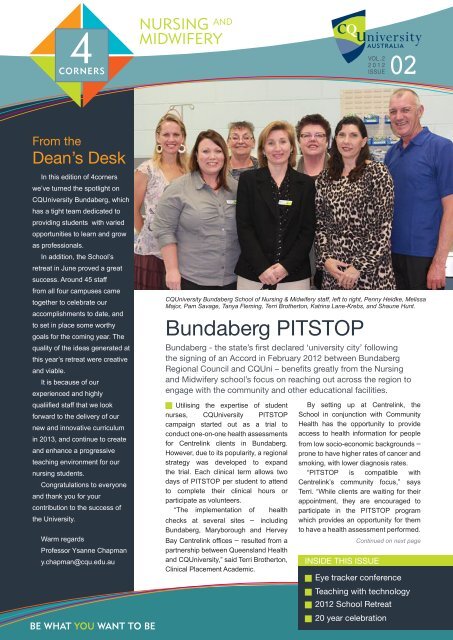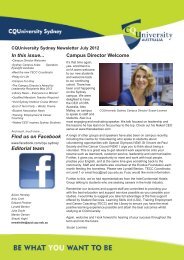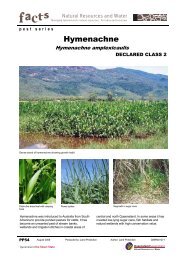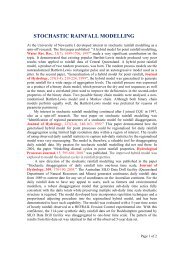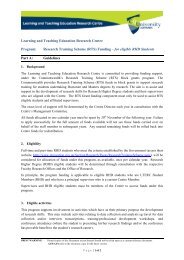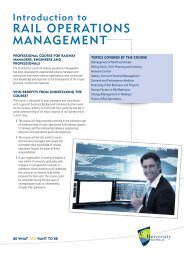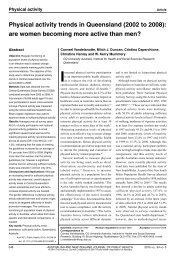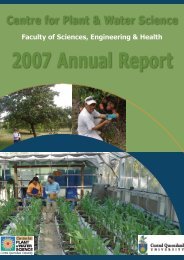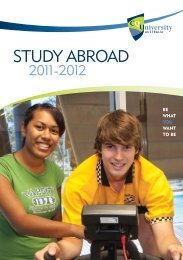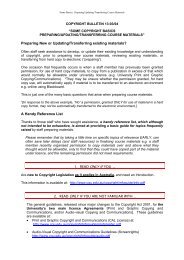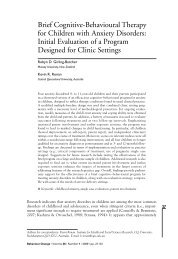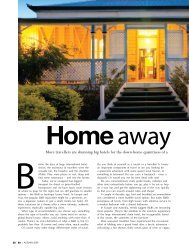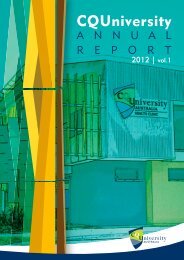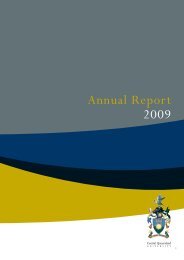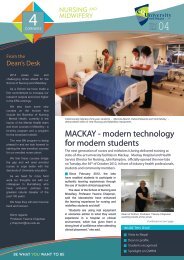4 Corners Newsletter - Vol 2 - Central Queensland University
4 Corners Newsletter - Vol 2 - Central Queensland University
4 Corners Newsletter - Vol 2 - Central Queensland University
You also want an ePaper? Increase the reach of your titles
YUMPU automatically turns print PDFs into web optimized ePapers that Google loves.
4<br />
CORNERS<br />
VOL . 2<br />
2012<br />
ISSUE02<br />
From the<br />
Dean’s Desk<br />
In this edition of 4corners<br />
we’ve turned the spotlight on<br />
CQ<strong>University</strong> Bundaberg, which<br />
has a tight team dedicated to<br />
providing students with varied<br />
opportunities to learn and grow<br />
as professionals.<br />
In addition, the School’s<br />
retreat in June proved a great<br />
success. Around 45 staff<br />
from all four campuses came<br />
together to celebrate our<br />
accomplishments to date, and<br />
to set in place some worthy<br />
goals for the coming year. The<br />
quality of the ideas generated at<br />
this year’s retreat were creative<br />
and viable.<br />
It is because of our<br />
experienced and highly<br />
qualiified staff that we look<br />
forward to the delivery of our<br />
new and innovative curriculum<br />
in 2013, and continue to create<br />
and enhance a progressive<br />
teaching environment for our<br />
nursing students.<br />
Congratulations to everyone<br />
and thank you for your<br />
contribution to the success of<br />
the <strong>University</strong>.<br />
Warm regards<br />
Professor Ysanne Chapman<br />
y.chapman@cqu.edu.au<br />
CQ<strong>University</strong> Bundaberg School of Nursing & Midwifery staff, left to right, Penny Heidke, Melissa<br />
Major, Pam Savage, Tanya Fleming, Terri Brotherton, Katrina Lane-Krebs, and Shaune Hunt.<br />
Bundaberg PITSTOP<br />
Bundaberg - the state’s first declared ‘university city’ following<br />
the signing of an Accord in February 2012 between Bundaberg<br />
Regional Council and CQUni – benefits greatly from the Nursing<br />
and Midwifery school’s focus on reaching out across the region to<br />
engage with the community and other educational facilities.<br />
Utilising the expertise of student<br />
nurses, CQ<strong>University</strong> PITSTOP<br />
campaign started out as a trial to<br />
conduct one-on-one health assessments<br />
for Centrelink clients in Bundaberg.<br />
However, due to its popularity, a regional<br />
strategy was developed to expand<br />
the trial. Each clinical term allows two<br />
days of PITSTOP per student to attend<br />
to complete their clinical hours or<br />
participate as volunteers.<br />
“The implementation of health<br />
checks at several sites – including<br />
Bundaberg, Maryborough and Hervey<br />
Bay Centrelink offices – resulted from a<br />
partnership between <strong>Queensland</strong> Health<br />
and CQ<strong>University</strong>,” said Terri Brotherton,<br />
Clinical Placement Academic.<br />
By setting up at Centrelink, the<br />
School in conjunction with Community<br />
Health has the opportunity to provide<br />
access to health information for people<br />
from low socio-economic backgrounds –<br />
prone to have higher rates of cancer and<br />
smoking, with lower diagnosis rates.<br />
“PITSTOP is compatible with<br />
Centrelink’s community focus,” says<br />
Terri. “While clients are waiting for their<br />
appointment, they are encouraged to<br />
participate in the PITSTOP program<br />
which provides an opportunity for them<br />
to have a health assessment performed.<br />
INSIDE THIS ISSUE<br />
Continued on next page<br />
Eye tracker conference<br />
Teaching with technology<br />
2012 School Retreat<br />
20 year celebration
PITSTOP Continued from previous page<br />
behavior change and are an important part<br />
of staff training on community resources.”<br />
PITSTOP Health checks result in<br />
hundreds of participants moving from low<br />
awareness of health issues to participate in<br />
programs to improve their health.<br />
Client driven referrals include Quit line,<br />
Breast screen, Lighten Up!, Living Strong<br />
and the National bowel Cancer Screening<br />
Program.<br />
“Our nursing students thoroughly enjoy<br />
their involvement with PITSTOP as it<br />
provides hands-on experience, enabling<br />
them to put theory from health promotion<br />
into action,” says Terri. “It also provides<br />
an opportunity for students to improve<br />
their knowledge and practice their client<br />
interviewing skills, whilst working in<br />
partnership with other groups such as<br />
Cancer Council <strong>Queensland</strong>.”<br />
Terri believes the PITSTOP program<br />
provides an ideal opportunity for many<br />
<strong>Queensland</strong> Health practitioners to work in<br />
partnership with CQ<strong>University</strong> to promote<br />
real-life experiences working in health<br />
promotion.<br />
BDG<br />
CQU Bundaberg is an<br />
easy bike ride from most<br />
areas of Bundaberg<br />
Overall, up to 10 tables are set up to<br />
allow each health worker to undertake an<br />
interview of each client’s lifestyle. Health<br />
issues covered in the assessment, include<br />
physical activity, nutrition, alcohol, smoking,<br />
skin cancer prevention, early detection for<br />
cancer – breast, testicular, bowel, prostate,<br />
cervical – and mental health.<br />
“Motivational interviewing and stages of<br />
change principles are incorporated in the<br />
education, with a focus on health referrals<br />
and cancer education,” says Terri. “We<br />
find that referrals increase the potential for<br />
The Accord was signed<br />
by L-R Council CEO<br />
Peter Byrne, Vice-<br />
Chancellor Professor<br />
Scott Bowman, Mayor<br />
Cr Lorraine Pyefinch<br />
and Bundaberg Head<br />
of Campus Professor<br />
Phillip Clift.<br />
Bundaberg<br />
– the university city<br />
Bundaberg Regional Council and<br />
CQ<strong>University</strong> Australia signed an Accord<br />
in February 2012 as a formal expression<br />
of their common goals and partnership<br />
intentions.<br />
Professor Clift said it is well documented<br />
that regional communities which host<br />
university campuses, benefit from enhanced<br />
economic, social and environmental<br />
outcomes.<br />
“CQ<strong>University</strong> has pledged to be ‘multicity’<br />
and fully engaged with its communities,”<br />
he said.<br />
BDG<br />
2
Holistic Nursing<br />
The School of Nursing and Midwifery plays an active role in community<br />
engagement through activities in learning and teaching, research<br />
and service. The staff across the School’s four campuses – Mackay,<br />
Bundaberg, Noosa and Rockhampton – encourage student engagement<br />
in the education process.<br />
With an emphasis on work integrated learning, the theoretical content of<br />
each program is transferable and applied in the variety of environments in<br />
which nurses and midwives are employed.<br />
Shaune Hunt<br />
with students at a<br />
Holistic Residential<br />
School – part of<br />
the Holistic Nursing<br />
Assessment for<br />
first year nursing<br />
students.<br />
Katrina Lane-Krebs<br />
with students at a<br />
Holistic Residential<br />
School – a<br />
residential designed<br />
for distance<br />
students.<br />
Journal Articles<br />
Reid-Searl, K., Happell, B., &<br />
Vieth, L. (2012). High fidelity patient<br />
silicone simulation: A qualitative<br />
evaluation of nursing students’<br />
experiences. Collegian, 19, 77-83.<br />
Brown, Guinea, Crookes,<br />
McAllister, Levett-Jones, Kelly,<br />
Reid-Searl, Churchouse, Anderson,<br />
Chong & Smith (2012). Clinical<br />
simulation in Australia and New<br />
Zealand: through the eyes of an<br />
advisory group. Collegian, In Press.<br />
Happell, B., Dares, G., Russell,<br />
A., Cokell, S., Platania-Phung,<br />
C., & Gaskin, C. (2012). The<br />
relationships between attitudes<br />
toward seclusion and levels of<br />
burnout, staff satisfaction, and<br />
therapeutic optimism in a district<br />
health service. Issues in Mental<br />
Health Nursing, 33, 329-336.<br />
Book Chapters<br />
Rossi, D. (in print).<br />
Conceptualising education<br />
research participants as<br />
‘significant others’ in the<br />
construction of empirical<br />
knowledge. In W. Midgley, P. A.<br />
Danaher & M. Baguley (Eds.),<br />
The role of Participants: Ethics,<br />
Epistemologies and Methods. NY:<br />
Taylor & Francis/Routledge.<br />
Rossi, D. (in print). Learning<br />
relationships: A condition and<br />
consequence of learner-learner<br />
interaction in online contexts. In<br />
B. Tynan & J. Willems (Eds.),<br />
Proceedings from DEHub Summit,<br />
February, 2011. PA: IGI Global.<br />
Left: First year students at Holistic Residential School, where clinical skills are demonstrated and<br />
practiced before students undertake their first clinical placement. Right: Bundaberg Campus School of<br />
Nursing and Midwifery administration staff, L-R Tracey Woznitza and Bree Heidke.<br />
3
Inaugural<br />
eye tracker<br />
conference held<br />
at Noosa<br />
In June 2012 researchers from as<br />
far as Germany, Scotland, Ireland,<br />
England, South Africa, France,<br />
Malaysia and Finland gathered at<br />
the Noosa CQUni campus for Eye<br />
Track Australia 2012 – Australia’s<br />
first eye tracker conference.<br />
Held at CQ<strong>University</strong> Noosa<br />
in June, Eye Track showcased<br />
the latest developments in crossdisciplinary<br />
eye movement<br />
research, bolstering the Noosa<br />
Campus’ reputation as a<br />
burgeoning research hub and<br />
leader in the eye tracking field since<br />
the development of the $73,000<br />
purpose built eye tracker facility.<br />
Eye tracking methodologies<br />
hold significant implications for<br />
nursing practice, education and<br />
research, specifically in the design<br />
of instruction in reading complex<br />
diagnostic displays.<br />
CQUni researchers from<br />
the School of Nursing and<br />
Midwifery – Dr Marc Broadbent<br />
and Associate Professor Melanie<br />
Birks – presented updates at the<br />
conference on current research<br />
projects undertaken by the School.<br />
“Eye tracking technology<br />
holds great promise for research<br />
in nursing and the conference<br />
was a way of understanding the<br />
possibilities for nurse education,<br />
both in university and field<br />
placement contexts,” said Marc.<br />
Cont’d over page<br />
Nicholas Ralph wins $10,000<br />
CQ<strong>University</strong> Noosa lecturer Nicholas Ralph won the 2012 Australian<br />
Nurse of the Year (Innovation in Nursing) award of $10,000 for his concept<br />
for a multi-functional Mobile Clinical Learning Unit (M-CLU) for the<br />
Sunshine Coast.<br />
Nicholas intends to use the development<br />
grant prize money provided by ME Bank to<br />
enhance the project through research and<br />
evaluation.<br />
“This award not only acknowledges the<br />
M-CLU’s worth, it strengthens the project<br />
in the eyes of those who will fund further<br />
phases down the track.”<br />
The M-CLU is a dynamic 10-metre splitlevel<br />
trailer which is home to a simulation<br />
deck and a realistic ward environment<br />
featuring a simulated mannequin patient.<br />
The unit enables health professionals to<br />
hone their skills and also promotes health<br />
careers, while there are plans for it to roll out<br />
to schools and other public areas to bolster<br />
health recruitment, training and health<br />
promotion.<br />
“The most innovative aspect of<br />
the unit is that it uses simulation as a<br />
tool for recruitment,” says Nicholas.<br />
“Using simulation spaces where<br />
health professionals can develop<br />
and sharpen their skills is proving<br />
to be an effective and dynamic<br />
teaching tool.<br />
The M-CLU will visit schools,<br />
shopping centres, sports grounds<br />
and public parks to give participants<br />
a taste of the opportunities a career in health<br />
can offer. It also has huge potential for<br />
remote areas such as mining towns, where<br />
training programs are of great value to the<br />
community.<br />
With a looming skills shortage in a<br />
region that will require 50,000 new health<br />
professionals over the next 20 years,<br />
the M-CLU goes a long way to engaging<br />
Nicholas receives his $10,000 prize cheque from<br />
ME Bank as the HESTA* Australian Nursing<br />
Awards ‘innovation’ winner. From left: Bronwyn<br />
Barling (ME Bank), Nicholas Ralph, Michael<br />
Scanlon HESTA Super Fund.<br />
those thinking about a career as a health<br />
professional.<br />
“The primary aim of this initiative is<br />
improve healthcare in the region – whether it<br />
be through opening up career opportunities<br />
in health to the public, upskilling the regional<br />
health workforce or improving the health<br />
of our communities using health promotion<br />
strategies,” Nicholas said.<br />
NSA<br />
ART nursing research recognised globally<br />
Norma West OBE formally<br />
acknowledges Dr Judith<br />
Applegarth (left) for completing her<br />
PhD titled: Understanding Assisted<br />
Reproductive Technology Nursing<br />
Practice in Australia – A Grounded<br />
Theory Study.<br />
4<br />
The accolades for CQ<strong>University</strong>’s<br />
Dr Judith Applegarth continue as her<br />
research into assisted reproductive<br />
technology generates global interest.<br />
Not only has Dr Judith Applegarth – an assisted<br />
reproductive technology (ART) nurse – received<br />
formal acknowledgement of her conferral for the<br />
award of Doctor of Philosophy, her abstract titled:<br />
Delivering ‘bad news’ – a key aspect in provision of<br />
support in assisted reproductive technology nursing<br />
practice was selected for the Award for Nurses at<br />
the 28th Annual Meeting of European Society of<br />
Human Reproduction and Embryology (ESHRE) in<br />
Istanbul, Turkey this July. Also Dr Applegarth is an<br />
invited speaker at ESHRE conference.<br />
“To be invited as a speaker at such a prestigious<br />
multidisciplinary conference acknowledges Judy’s<br />
significant contribution to ART Nursing,” said<br />
Professor Chapman.
Nurses celebrate profession<br />
Eye tracker<br />
conference<br />
International Nurses Day organising committee and presenters gather at CQUni Rockhampton.<br />
CQ<strong>University</strong> hosted International<br />
Nurses Day (IND), at its Rockhampton<br />
Campus to celebrate local and <strong>University</strong><br />
talent – Jenny Anderson was announced as<br />
Australian Nurse of the Year for rebuilding<br />
the hospital renal service (refer article<br />
below), and Noosa’s Nicholas Ralph was<br />
announced the Australian Nurse of the Year<br />
for Innovation (refer article left).<br />
Over 70 participants attended the IND<br />
event which included a keynote address by<br />
Belinda Maier, State Midwifery Advisor.<br />
Concurrent sessions on<br />
‘Midwifery’ (chaired by Sue Nouwens from<br />
the Mater Hospital) and ‘Nursing’ (hosted by<br />
CQUni Associate Professor Trudy Dwyer),<br />
featuring both health service and academic<br />
speakers proved popular. Associate<br />
Professor Kerry Reid-Searl chaired the<br />
evening session in her guise as the<br />
endearing patient ‘Stan’.<br />
<strong>Queensland</strong> Nurses Union Legal Officer<br />
Jamie Shepherd spoke about legal issues<br />
for nurses.<br />
Professor Ysanne Chapman – Dean,<br />
School of Nursing and Midwifery; Brenda<br />
Happell, Engaged Research Chair Professor,<br />
and Jenny Davis. Head of the Midwifery<br />
Program promoted the School’s ongoing<br />
contribution to the nursing profession.<br />
“Developments in professional nursing<br />
have had significant impact on social and<br />
public health services over the last decade,”<br />
said Professor Chapman. “Beyond our<br />
ongoing service to the community, we are<br />
actively advancing scholarly inquiry and<br />
research at CQUni.”<br />
ROK<br />
Nurse of the Year - Jenny Anderson<br />
Nurse of the year, Jenny Anderson, has been credited with<br />
strengthening and expanding the renal unit, including creating its<br />
new purpose-built home, expanding home therapy services, building<br />
a new staff team and focusing on culturally appropriate services for<br />
Aboriginal patients.<br />
Rockhampton Hospital Renal Service nurse Jenny Anderson was named Nurse<br />
of the Year for her work turning around a service that was struggling under a rapidlyexpanding<br />
workload and significant nursing workforce issues.<br />
Today Rockhampton Hospital Renal Service has a dynamic team of mainly young<br />
nursing staff, assisted by a select band of experienced nurses “cajoled” out of<br />
retirement by Ms Anderson.<br />
The unit has moved into new purpose-built premises, established a satellite unit<br />
at Gladstone Hospital and significantly expanded home therapy services, allowing<br />
many patients to avoid a three-hour drive for treatment.<br />
Ms Anderson was awarded $5000 and a $5000 education grant.<br />
ROK<br />
Continued from previous page<br />
“It is important that<br />
nurses understand and apply the<br />
meaning of diagnostic information<br />
conveyed in visual display format.<br />
Understanding the condition of<br />
patients revealed by such displays<br />
is a critical factor in determining<br />
patient outcomes.”<br />
A highlight of the conference<br />
was a discussion on the<br />
integration of eye tracking<br />
and Electroencephaologram<br />
(EEG) technology, that allows<br />
researchers to measure human<br />
emotions, providing a complete<br />
picture of how a person responds<br />
to an image<br />
In the lead up to the conference,<br />
CQ<strong>University</strong> Noosa hosted an eye<br />
tracker training day as international<br />
and Australian researchers shared<br />
techniques and approaches to the<br />
technology, broadening the local<br />
knowledge and expanding the<br />
<strong>University</strong>’s research network.<br />
“As the eye tracking technology<br />
is new to Noosa and very new<br />
as a medium for research in<br />
nursing, the conference was a<br />
great opportunity to see how<br />
other researchers are using<br />
eye tracking technology in their<br />
disciplines,” said Marc.<br />
“Ongoing research can provide<br />
a platform for better understanding<br />
cognitive processing by analysing<br />
the way that clinicians view, attend<br />
to and process complex visual<br />
displays such as diagrams, charts,<br />
and representations and their<br />
features.”<br />
NSA<br />
5
Reaching Out<br />
Developing ties to the local<br />
community is a key aspect of Katrina<br />
Lane-Krebs’ role at CQUni. To this<br />
end, Katrina’s networking activities<br />
this year have included a guest<br />
presentation at STEPPING Stones<br />
on inclusiveness of special needs<br />
children; a service presentation for<br />
parent supervisors in the use of Epi<br />
pens for children at primary school<br />
(with a session on managing children<br />
with special needs); and a Farming<br />
for the Future presentation Dinner in<br />
association with Bundaberg Christian<br />
College, Kepnock State High School,<br />
Chamber of Commerce, Farming<br />
Welfare and representatives from<br />
Denmark Vocational Colleges and<br />
CQ<strong>University</strong>.<br />
“Timed to fit in with Australia’s<br />
International Year of the Farmer, the<br />
focus on mental health and wellbeing<br />
issues that are common between<br />
Australian and Danish agricultural<br />
environments was discussed,” said<br />
Katrina. “A further collaborative<br />
short term project is currently being<br />
planned with Farming for the Future<br />
to explore emotional and mental<br />
health issues amongst farmers.”<br />
Katrina also attended several<br />
site visits to view the progress of<br />
the new <strong>Queensland</strong> Children’s<br />
Hospital in Brisbane. She continues<br />
to be heavily involved in the<br />
Foundation for Medical Research<br />
and associated services with the<br />
Children’s Hospital Foundation.<br />
Intra faculty research projects, in<br />
early the planning stages, include a<br />
brief exploration into the impacts of<br />
the “fly in fly out” aspect of Australian<br />
mining communities to be undertaken<br />
by Katrina and Trixie James (STEPS).<br />
Katrina along with Dr Melinda McHenry<br />
(Science) are also working to develop<br />
workshops in distance learning using<br />
technology to be presented to the<br />
delegates home institutions, resulting<br />
from Denmark-Bundaberg exchange<br />
for Farming For The Future Agricultural<br />
connection.<br />
Dancing with special needs<br />
Katrina Lane-Krebs could have been a circus juggler given her professional<br />
and personal balancing act, which includes advisor to the <strong>Queensland</strong><br />
Children’s Hospital; tutor and lecturer at CQUni; mother of seven (one<br />
special needs child); advocate for people with disabilities and dancer.<br />
“Due to her own experience raising,<br />
Christian, her special needs son, Katrina is<br />
passionate about advocating for the inclusion<br />
of special needs children, and particularly<br />
using creative teaching tools to develop<br />
communication skills and optimize mobility.<br />
“As a former dancer, I am currently involved<br />
in researching the value of dance and music<br />
therapy for improving psychosocial, medical<br />
and neuro-developmental aspect of children<br />
with cerebral palsy,” said Katrina. “Part of<br />
this experience formed the basis for my<br />
Master’s thesis.”<br />
Workshops on hydro, dance and music<br />
therapy as a rehabilitation intervention are<br />
part of Katrina’s teaching tools, however, her<br />
preference is dance as it allows for inspired<br />
expression and individuality.<br />
“Dance allows room for creative thinking<br />
and the acceptance of varied concepts ... to<br />
express the inner you in a fun, energetic and<br />
engaging way that is nonjudgmental.”<br />
The benefits of incorporating performance<br />
texts to the areas of teaching and learning<br />
has been exemplified for Katrina after<br />
working with Dr Kerry Reid-Searl, who<br />
utilizes masks and puppets to teach.<br />
“Kerry is the guru of all things theatrical<br />
and she understands the powerful impact<br />
of role playing to enhance learning. I am<br />
fortunate to have her as my mentor.”<br />
Katrina’s passion for teaching resulted in a<br />
previous nomination (by a student) for the Pride<br />
of Australia medal in education. Her personal<br />
teaching philosophy includes three elements.<br />
“The first is to foster an inquisitive mind and<br />
develop an excitement to learn. Secondly, I<br />
seek to provide students with a methodology<br />
to obtain knowledge through enhancing critical<br />
thinking skills – rather than simply impart content<br />
and facts. The overriding element however, is<br />
to engage the student by making learning an<br />
enjoyable process.”<br />
A Masters completed in 2010 titled:<br />
Dancing in the Spotlight: a creative writing<br />
approach depicting the lived experience of<br />
parenting a child with special needs explored<br />
Katrina’s focus on recording interventions for<br />
addressing post traumatic stress disorder<br />
and the chronic strain that accompanies the<br />
parental journey of a special needs child.<br />
As her Master’s foreword states: There<br />
are no instruction manuals in life. In the<br />
midst of despair, a person can be clutching<br />
Katrina Lane-Krebs, recently nominated for a National<br />
Teaching Excellence Award, has clinical experience in<br />
Mental Health, Forensic environments, pediatric rehab,<br />
hemophilia, oncology, ICU and palliative care.<br />
at straws in an effort to maintain their sanity<br />
and make sense of their current world and<br />
in fact, simply to trying to survive … deriving<br />
strength from others and relating to their own<br />
life stories is a place of beginning, where<br />
one’s soul can recuperate and restoration of<br />
the human spirit can commence. I know this,<br />
for I have danced with the devil.<br />
Katrina is now progressing her PhD which<br />
continues to detail the challenges of life with<br />
a special needs child within the framework<br />
of holistic health and welfare issues. Katrina<br />
is also involved in research for paediatric<br />
rehabilitation and prepares reflective<br />
narratives to document the experiences of<br />
children, parents and carers … to capture<br />
the experiences from a holistic perspective.<br />
“Interventions and meeting rehabilitation<br />
needs for special needs children have<br />
significant impact on family dynamics ... the<br />
unseen side of disability.”<br />
As a member of the Advisory committee<br />
for the planning stages of the proposed<br />
<strong>Queensland</strong> Children’s Hospital, Katrina<br />
represented the interests of those in rural and<br />
remote areas, as well as Indigenous and nonenglish<br />
speaking consumers. She continues<br />
to serve as an advisory committee member<br />
to support the implementation stages until<br />
the receipt of the first patients in 2014.<br />
Katrina’s aspirations include securing a<br />
position on the Management Board of the<br />
<strong>Queensland</strong> Children’s Hospital, but she has<br />
no plans to leave her teaching role behind.<br />
In fact, she’s been at CQUni for so long<br />
we are surprise she doesn’t have an asset<br />
tag attached.<br />
BDG<br />
6
TEACHING WITH TECHNOLOGY<br />
Melissa Hulme, Laboratory Supervisor/Instructor (Health) at CQUni, believes<br />
that teaching with technology opens the door to many new teaching<br />
approaches for nurse educators, but it is a learned skill that involves<br />
considerable knowledge and ability.<br />
“The compelling need for technological<br />
fluency and competency among nurse<br />
educators has increased with the introduction<br />
of simulation models such as SimMan 3G and<br />
hi-tech computer teaching aids,” says Melissa.<br />
“While these technological innovations allow<br />
for more choices, enhanced faculty-student<br />
interaction, and variations in learning, the<br />
nurse educators still need to incorporate the<br />
technology into their repertoire of teaching<br />
strategies.”<br />
Melissa heads a multi-expertise technical<br />
support team of five that provides highquality<br />
and effective technical support to<br />
nurse educators across four campuses<br />
– Rockhampton, Mackay, Bundaberg and<br />
Noosa.<br />
“The team provides resources that<br />
simulate real life experiences, from the<br />
paperwork they might expect to use in a clinic<br />
to wound exudate that is “real’ looking,” says<br />
Melissa. “We provide pathology trays that<br />
mirror exactly the equipment that would be<br />
used for venipuncture; chest drains that are<br />
used currently in industry; and a resuscitation<br />
trolley that reflects current industry standard.”<br />
These are just a couple of examples of what<br />
we provide.<br />
Each technician identifies the academics’<br />
diverse needs and oversees the progress of<br />
all programs at their campus. The technical<br />
staff are provided the Laboratory requirements<br />
by the Course Coordinator and then discuss<br />
the needs of the academic in relation to that<br />
list for each campus. Prior to each teaching<br />
program the technician is on hand to assist in<br />
the set up of the labs and where necessary<br />
to demonstrate the use and features of<br />
the technology, and during the class the<br />
technician is available to operate mannequins<br />
and address any technical issues that arise.<br />
“The team understand the potential<br />
of current learning technologies and are<br />
adept at liaising with academics, students<br />
and stakeholders across disciplines at the<br />
university,” says Melissa. “For example,<br />
with the recent course accreditation, we<br />
are required to have one Nursing Annie<br />
mannequin for every second bed across<br />
four campuses and infusion pumps for every<br />
second bed at each campus, which involves<br />
a lot of functionality and capability training.<br />
Plus, there is the ongoing training of the new<br />
SimMan 3G at Noosa campus to ensure that<br />
it is utilised to its full potential.<br />
Melissa says communication is important<br />
and her team ensures all academics receive<br />
‘multi-point support’ and encourage the<br />
academics to discuss their needs to the<br />
technical staff to ensure a quality educational<br />
environment including technical training<br />
workshops, one on one meetings, and face<br />
to face support to ensure that the labs are set<br />
up to accommodate student numbers.<br />
“It’s important that we utilise the time of<br />
academics and technical staff effectively,<br />
and it is critical to the ongoing improvement<br />
of the program that we have the opportunity<br />
to discuss concerns and develop good<br />
practice with technologies in teaching.<br />
In addition, the team relies on anecdotal<br />
evidence from student’s perception and<br />
experience of the technology and the effects<br />
on student learning. Ongoing modifications<br />
and enhancements are made so the final<br />
deliverable is aligned with best educational<br />
practice and reflect industry changes.<br />
The team itself relies on video links for<br />
meetings and catch-ups, and retains close<br />
network ties to the industry and foster<br />
relationships with local clinical educators to<br />
remain abreast of industry standards. “The<br />
best part of the job is the ongoing contact we<br />
have with the students,” says Melissa. “You<br />
see the growth from first to third year students,<br />
and it is wonderful to be a part of that.”<br />
Strengthening<br />
regional<br />
relationships<br />
In July, Professor Ysanne<br />
Chapman and Assoc Professor<br />
Melanie Birks attended the<br />
2012 Nursing and Allied Health<br />
Conference in Malaysia themed<br />
‘Evidence and Practice: the<br />
twain shall meet’ to converse on<br />
evidence based practice (EBP)<br />
across all medical fields.<br />
“The Malaysian hosts<br />
were welcoming, friendly<br />
and talked of developing a<br />
continuing relationship with the<br />
School,” said Ysanne. “It was<br />
a dynamic conference, where<br />
new professional friendships<br />
were forged with nursing<br />
and allied health colleagues,<br />
possible projects discussed with<br />
researchers in Malaysia, as well<br />
as potential higher degrees by<br />
research students.<br />
“For the vivacious and everpopular<br />
Melanie, it was an<br />
opportunity to reconnect with past<br />
colleagues and students.”<br />
Melanie Birks learnt how to throw a<br />
poison dart from a Borneo tribesman.<br />
7
Mask-Ed’s media<br />
profile broadens<br />
Pam Savage’s talent for teaching<br />
The multifaceted CQUni Lecturer, Pam Savage, began her love affair with<br />
nursing in the 1970s, following a brief foray into journalism.<br />
CQUni’s Mask-EdTM (KRS<br />
simulation) program is drawing<br />
increasing media interest as<br />
Universities incorporate the novel<br />
education tool into their nursing<br />
and medical curriculum.<br />
Developed by Dr Kerry Reid-<br />
Searl, the MaskEdTM (KRS<br />
simulation) takes a simple<br />
concept – masking knowledgeable<br />
educators – to create a realistic<br />
and spontaneous simulation of<br />
patient/nurse interaction. The<br />
silicon masks and wearable body<br />
parts, include torsos (with working<br />
appendages); as well as arms,<br />
hands and feet (with wounds).<br />
Monash Associate Professor<br />
Simon Cooper, said: “This type of<br />
program addresses this growing<br />
dimension of health care that many<br />
preparatory nursing courses do<br />
not and is designed for students to<br />
gain a broader range of skills than<br />
those taught in traditional nursing<br />
programs,” www.melbournereview.<br />
com.au/read/502/<br />
In other news, the<br />
Rockhampton Mirror covered<br />
Dr Reid-Searl’s visit to Colorado<br />
State <strong>University</strong> to promote the<br />
simulated learning experience;<br />
ABC Radio and the ABC TV<br />
(7.30 Report) have interviewed Dr<br />
Reid-Searl; and The Sunday Mail<br />
(Brisbane) featured Dr Reid-Searl<br />
as alter ego Cyril Smith – retired<br />
butcher with diabetes.<br />
After graduating as an RN, Pam<br />
travelled throughout South America for<br />
several months before gaining a green<br />
card to work in Dallas Presbyterian<br />
Hospital Texas for a year. Following<br />
tours throughout USA and Canada,<br />
Pam chose the standard Australian<br />
nurse path of Agency nursing at the<br />
London clinic, which allowed her<br />
to travel throughout Europe and<br />
the Middle East undertaking short term<br />
contracts that expanded her clinical skills<br />
and knowledge.<br />
While based in the UK Pam completed<br />
a Diploma in Nursing at London <strong>University</strong>,<br />
before heading home to complete a BA<br />
Education.<br />
“I made the decision as a very young<br />
women that the only way to make nursing<br />
better - to improve the systems - was through<br />
education.” said Pam. “I did not consider<br />
the education I had in nurse training was<br />
sufficient to the role and function that I seem<br />
to find I was performing.<br />
A Masters in Health Personnel Education<br />
at the <strong>University</strong> of NSW cemented her<br />
career in clinical and nurse education and<br />
opened doors to work as a consultant and<br />
researcher to health facilities developing<br />
their peer review and accreditation models.<br />
After being enrolled as a Barrister at Law in<br />
NSW, Pam expanded her range of skills and<br />
developed a unique approach to problem<br />
solving and critical thinking.<br />
“Legal reasoning insists that you look at<br />
the world without a personal motive and to<br />
reason. You are much more likely to weigh<br />
pros or cons, or look for the source of<br />
issues. Whereas, as nurses, we talk about<br />
problem solving from concrete or personal<br />
approaches.”<br />
In 1997, Pam returned to her first love,<br />
clinical nursing, working at Alice Springs<br />
Hospital paediatric unit, then training as a<br />
dialysis nurse where she developed the<br />
an Indigenous nurse education proposal to<br />
develop health worker opportunities. This<br />
became part of the NT Bachelor Institute of<br />
Tertiary Education Aboriginal health worker<br />
program when she joined them<br />
“My time up North opened doors<br />
to transcultural experiences that have<br />
continued to be an active part of my study<br />
and teaching interest,” said Pam. “It taught<br />
me that the ability to understand someone<br />
else’s culture is a lifetime commitment.”<br />
For Pam the key is to be open and<br />
respectful to difference.<br />
“When someone believes or does<br />
something outside of your system, our<br />
instinct is that they are wrong, but the<br />
challenge is to balance the belief system of<br />
another with your own. Let’s face it, even<br />
the medical system is a culture in its own<br />
right.”<br />
Pam’s teaching technique is built on<br />
raising awareness and shining a light on<br />
different ways of looking at an issue.<br />
“Even if you can just get people to consider<br />
another perspective it’s at least respectful of<br />
someone else’s way of seeing the world and<br />
way of choosing to manage their life.”<br />
Since joining CQUni Mackay Campus in<br />
2001, Pam has seen significant growth in<br />
student nurse numbers, and has contributed<br />
to developing an integrated practicum<br />
experience for students in local facilities,<br />
which builds on close relationships with<br />
clinical staff willing to share and develop both<br />
university and industry learning for nurses.<br />
“The roles of nurses have exploded<br />
open over the last decade,” says Pam. “The<br />
pressure to validate your worth by clinical<br />
currency is no longer a major driving force.<br />
A few years ago if you hadn’t had recent<br />
clinical experience you could have lost your<br />
registration. Whereas now it is recognized<br />
that within the realm you work if it is current<br />
and contributing to the profession you don’t<br />
have to justify calling yourself a nurse.<br />
That’s a change in the game and a huge<br />
and positive step.”<br />
Pam’s focus on transcultural, curriculum<br />
and legal areas led to a number of<br />
publications focused on issues of theorypractice<br />
gaps and the commencement of<br />
doctoral studies culminating in the award of<br />
Doctor of Education in 2011. The work for<br />
her doctorate delved into the legal aspects<br />
of clinical nursing and explored clinician<br />
perspectives of legal risks in practice.<br />
The publication of a text, Legal Issues for<br />
Student Nurses, was informed by research<br />
findings in her study.<br />
With an intense gaze that crinkles into<br />
a warm smile when her pet subjects are<br />
triggered, Pam is the first to admit that she<br />
does not tolerate fools easily, much less<br />
8
elationship with the School.<br />
arrogance in health professionals. Her goal<br />
as teacher is to encourage students to have<br />
confidence in their own reasoning, so that the<br />
chances of them being damaged and insecure<br />
in their decision-making are reduced.<br />
“While the role and function of the nurse has<br />
become less physically stressful, the intellectual<br />
risks and fear of consequences take a serious<br />
toll on nurses. The system is more bureaucratic<br />
and audit focused, and nurses are the people<br />
left to carry that responsibility … that justification<br />
to be perfect and never make a mistake or to<br />
be found wanting.<br />
The curriculums for nurse education<br />
accommodate the expanded obligations<br />
inherent in being a RN, to include writing,<br />
language and communication.<br />
“My time up North opened<br />
doors to transcultural<br />
experiences that have<br />
continued to be an active part of<br />
my study and teaching interest.”<br />
“As educators our role is to arm them<br />
with the skills and ways of thinking to move<br />
forward confidently and articulate their<br />
position to their peers. A failure to act because<br />
of fear of consequences – in the sense of<br />
personal consequences such as discipline or<br />
condemnation – can be devastating.”<br />
For Pam, it is a challenge to impose on<br />
students rational thinking long before they<br />
are in those decision-making roles.<br />
“On one hand we are teaching high order<br />
reasoning and in the next hand discipline and<br />
rigid performance to protocols and procedures.<br />
“While you can’t put an old head on young<br />
shoulders, what you can do is open the minds<br />
so that they are open to alternate ways of<br />
doing something or seeing something.” BDG<br />
Movements<br />
at Noosa<br />
Tracey Simes has taken on<br />
the role of Clinical Placement<br />
Academic, taking over from<br />
Wendy Flanagan who has moved<br />
into a teaching role to support the<br />
internal Bachelor of Nursing.<br />
Tanya Burgess has moved<br />
from her role as Campus Faculty<br />
Administration Officer to School<br />
Administration Officer, supporting<br />
the Deputy Dean, Head of<br />
Program Midwifery with the<br />
development of new nursing and<br />
midwifery programs. NSA<br />
STUDENTS ON TRACK<br />
CQ<strong>University</strong> Australia, a valued partner of The Smith<br />
Family, is a significant supporter of its online mentoring<br />
program – iTrack – with several staff volunteering as mentors.<br />
Nursing lecturer Kadie Cheney from Rockhampton<br />
Campus volunteered for the iTrack program because she<br />
admired its philosophy.<br />
“The program provides students with the opportunity to<br />
develop relationships with trained mentors who can help them<br />
explore their options for the future,” says Kadie. “As mentors,<br />
our role is to listen, guide and support students by advising<br />
them on opportunities available to them in the workplace and<br />
higher education.”<br />
Where possible, The Smith Family matches students<br />
with mentors who have achieved professional success in a<br />
students’ chosen field of interest.<br />
“To date I’ve had one student from Year 10 who was<br />
exploring aspects of child care and another who was<br />
interested in veterinary science,” says Kadie. “The mentor<br />
program provides a way of giving your wisdom and<br />
experience and providing another voice - who is not a parent<br />
or family member – to help the student talk about their way<br />
forward into a career. There’s no personal details exchanged<br />
but the program helps to build the student’s esteem and<br />
guides them with study and career choices.”<br />
Campus Coordinator/<br />
Lecturer Carol McPherson<br />
from the School of Nursing<br />
and Midwifery at Noosa<br />
Campus says each student<br />
is carefully screened by the<br />
Smith Family and matched<br />
based on the profession<br />
and background of the<br />
mentor.<br />
Kadie Cheney, CQUni lecturer,<br />
School of Nusing and Midwifery<br />
“Twenty weeks of sharing in the life of a student towards<br />
the development of a career pathway, especially from a<br />
low socio-economic background, is more rewarding than<br />
I could ever have imagined,” said Carol. “These students<br />
demonstrate determination and tenacity and even though<br />
there is always some shyness or awkwardness, they do not<br />
fear obstacles and that’s what makes it so exciting.<br />
“I believe we have a strong obligation to our community<br />
to assist in career planning for school students and we<br />
(CQ<strong>University</strong>) need to have greater visibility in schools, often<br />
where the appropriate level of information is lacking.”<br />
For more information contact the National <strong>Vol</strong>unteer<br />
Coordination Unit on 1300 397 730 or email your enquiry to<br />
volunteer@thesmithfamily.com.au<br />
9
Winners of the<br />
Marshmallow<br />
Challenge<br />
2012 School of Nursing and<br />
Midwifery Retreat<br />
In June, around 45 staff from the School descended on Noosa to<br />
participate in the annual retreat to discuss learning and teaching,<br />
innovative research, community engagement and sustainable growth.<br />
Teamwork and tape secured the win.<br />
L-R Melissa Major BDG, Annette<br />
Sammut MKY, Terri Brotherton BDG.<br />
and Tanya Fleming BDG.<br />
There is no better place for ‘blue sky<br />
thinking’ than Noosa. Not only because the<br />
cloudless skies and sunshine dominate the<br />
lush green landscape, the Noosa Campus<br />
houses a state-of-the-art collaborative and<br />
colourful learning space, designed to foster<br />
creativity and innovation.<br />
Following a welcome from the Dean,<br />
Professor Ysanne Chapman, who<br />
acknowledged that the land belonged to<br />
the Gubbi Gubbi tribe, facilitator Tanya<br />
Rutherford jumpstarted brains with the<br />
Marshmallow Challenge – each team has<br />
to build the tallest free-standing structure<br />
within 18 minutes, using 20 sticks of<br />
spaghetti, one metre of tape, one metre<br />
of string, and one marshmallow (the<br />
marshmallow needs to be on top). The<br />
collaborative exercise encourages teams<br />
to experience lessons in innovation and<br />
creativity.<br />
Following are the takeaway thoughts<br />
from the retreat that included presentations<br />
on ‘Community Engagement’,<br />
‘Collaboration and Collegiality’, ‘Research’<br />
and ‘Simulation’, as well as workshops for<br />
research, teaching and professorial staff.<br />
1. Sustainable growth<br />
• Improve long term planning to identify<br />
resource needs upfront<br />
• Create greater staff support systems<br />
and development opportunities<br />
• Enhance communication with each<br />
other/ understanding each other<br />
• Work smarter – communicating<br />
internally and externally via IT<br />
• Focus on core business – Research,<br />
Learning & Teaching<br />
2. Community Engagement<br />
• Establish a presence at each campus<br />
with a leader at each campus<br />
• Provide monthly reports<br />
• Focus on key areas of engagement at<br />
each campus<br />
• Publicise conference celebrating 20<br />
years of nursing at CQUni<br />
3. Learning & Teaching<br />
• Support staff in the development of<br />
Quality Teaching<br />
• Implement and Develop curricula<br />
• Produce graduates that contribute<br />
positively to the profession, while<br />
promoting CQUni graduates as<br />
employees of choice<br />
• Enhance inclusiveness, accessibility<br />
and retention of students<br />
4. Create a space for research<br />
• Create a culture of scholarship<br />
• Establish and/or strengthen research<br />
relationships with industry partners<br />
• Develop a clear strategy to disseminate<br />
research outcomes to the wider<br />
communities<br />
• Urgent need for a school website that<br />
includes a research specific section<br />
• Develop a structured mentorship<br />
program<br />
• Quarantine time for research<br />
5. Administration<br />
• Benchmark – best practice reviews of<br />
IT systems<br />
• Risk Analysis (New systems and<br />
integrations)<br />
• Clarity of role expectations – What<br />
administration should Academics do<br />
• Champion to lobby VC for better IT<br />
systems (integrated, user friendly,<br />
effective, etc)<br />
• Campus to hire on-campus IT/ Moodle<br />
support<br />
• Consultation when IT outages planned<br />
(e.g. Not during results uploading time)<br />
• IT to interface Moodle with Grade<br />
Proforma<br />
• More Moodle support staff<br />
6. Communication<br />
• Rotate chair for school meetings<br />
• Face-to-face and electronic monthly<br />
meetings, on rotation<br />
• Professional staff meeting/ and<br />
Research meeting bi-monthly<br />
• Improve data collection by creating an<br />
invaluable information source<br />
• KPIs on attending school meetings<br />
10
Anthem of the 2%<br />
(Rockhampton’s Anthem, sung to<br />
Janis Joplin’s tune Mercedes Benz)<br />
Oh Lord<br />
Won’t you grant me an extension<br />
please<br />
My friends have distinctions<br />
I’m down on my knees<br />
I’ve not worked at all this year<br />
So listen to my plea<br />
Oh Lord won’t you grant me an<br />
extension please<br />
Oh Lord<br />
Please give an Informal Review<br />
My paper is crap<br />
So I’m counting on you<br />
Excuse that there’s no<br />
references<br />
I haven’t got a clue<br />
Oh Lord, won’t you grant me an<br />
Informal Review<br />
The School’s uber party<br />
theme - Be who you<br />
want to be - generated<br />
lots of laughter and<br />
frivolity as many indulged<br />
private fantasies.<br />
Oh Lord<br />
Won’t you grant me a deferred<br />
exam<br />
The terms nearly over<br />
And it’s too late to cram<br />
My dog has just died – the hard<br />
drive is fried<br />
I’m really in a jam<br />
Oh Lord, won’t you grant me a<br />
deferred exam<br />
We now know who wants<br />
to be a fairy princess (with<br />
magic wand) and a super<br />
woman (with funky red<br />
boots.)<br />
11
CQUni addresses<br />
nurse shortage<br />
CQ<strong>University</strong> is doing its part<br />
to inject more nurses into the<br />
state health system with a new<br />
online course aimed at retraining<br />
registered nurses.<br />
According to the <strong>Queensland</strong><br />
Nurses Union (QNI), <strong>Queensland</strong><br />
will be short about 14,000 nurses<br />
over the next two years.<br />
CQ<strong>University</strong>’s new Registered<br />
Nurse Re-Entry Course (CRNRC)<br />
program is the only one of its<br />
kind offered in <strong>Queensland</strong>. The<br />
online course is designed for<br />
registered nurses who have let<br />
their registration lapse or who have<br />
not practiced for a minimum of<br />
five years. Currently there are 19<br />
students enrolled in the program,<br />
who are living in all parts of Australia<br />
from Cooktown to Melbourne.<br />
CQUni’s <strong>Queensland</strong> Centre<br />
for Professional Health Education<br />
Director Deb Austen said the<br />
university identified a very strong<br />
need for the program.<br />
“This program is very important<br />
because there are a significant<br />
number of nurses seeking re-entry<br />
to the workforce, and they are<br />
able to be acknowledged for<br />
their previous experience while<br />
upgrading their knowledge of<br />
contemporary practice through a<br />
recognised course,” said Austen.<br />
The program is scheduled to<br />
run three times a year through<br />
CQ<strong>University</strong>.<br />
For more information on<br />
CQ<strong>University</strong>’s CRNRC program,<br />
join them on Facebook at www.<br />
facebook.com/CqUnicphe or<br />
contact Deb Austen<br />
d.austen@cqu.edu.au.<br />
Engaging online learners<br />
Online education for distant students is one of the fastest growing adult<br />
learning communities, but it does not mean ‘content is king’, according to<br />
the latest research.<br />
Funded by DEHub – a central research<br />
institute for investigation into best practices<br />
in distance education – researchers from<br />
content interactions in these courses?<br />
The team undertook an action research<br />
process that utilised a collective case<br />
<strong>Central</strong> <strong>Queensland</strong> <strong>University</strong> (CQUni) study design to reach cross-institution,<br />
and the <strong>University</strong> of Southern <strong>Queensland</strong> multidisciplinary understandings of the<br />
(USQ) investigated learner interaction in<br />
computer-mediated environments.<br />
“Distance education’s online environments<br />
offer an educational domain unique in their<br />
potential for interaction, participation and<br />
patterns, processes and consequences of<br />
learner-content, learner-learner and learnerteacher<br />
interaction in online courses.<br />
The conclusion from the research project<br />
is that learning management system (LMS)<br />
collaboration,” said Dolene Rossi, Lecturer,<br />
design features continue to favour learnercontent<br />
interactions.<br />
A major study planned at Noosa campus is a measurement of<br />
CQUni. “Still, little is known about the dynamics nurses’ responses and understanding of electrocardiographs (ECGs)<br />
and processes of learner interaction and how<br />
these relate to learning in online courses,<br />
which is why our research is invaluable.”<br />
Building upon different studies conducted<br />
by members of the project team (Beer, 2012;<br />
Rossi, 2010), two key questions were framed<br />
as a ‘way in’ to the investigation: How do<br />
learners interact in online courses? What are<br />
the patterns, processes and consequences of<br />
learner-learner, learner-teacher and learner-<br />
(From left) Professor Patrick Danahar, USQ; A/<br />
Professor Bobby Harreveld, CQUni; Damien Clark,<br />
CQUni; Colin Beer, CQUni; Dr Henriette Van<br />
Rensburg, USQ; and Dr Dolene Rossi, CQUni.<br />
AGED CARE FORUM<br />
CQ<strong>University</strong> Rockhampton hosted a forum for Aged Care<br />
nursing professionals in June in partnership with <strong>Queensland</strong><br />
Centre for Professional Development and the Centre for<br />
Professional Health Education – a division within CQ<strong>University</strong>’s<br />
School of Nursing.<br />
Managers of Aged Care facilities gathered to discuss their<br />
training needs, and provided a welcome opportunity for the<br />
<strong>University</strong> to showcase innovative nursing programs.<br />
The forum provided a great starting point to develop the training<br />
needs of the Aged Care industry, and for industry<br />
partners to brainstorm ideas for online short courses<br />
and face-to-face workshops. For more information<br />
contact Deborah Austen d.austen@cqu.edu.au<br />
“Of most interest to the teaching academic<br />
is that over-emphasis on content creation<br />
and learner-content interaction to engage<br />
learners is misguided,” said Dolene, chief<br />
investigator for the project. “Time may<br />
be better spent focusing on embedding<br />
interaction between learners, their peers and<br />
teachers in online course designs.”<br />
DEHub’s findings indicate that engagement<br />
with course content will naturally arise out of<br />
directed interaction between learners,<br />
their peers, and their teachers. However,<br />
the reverse is not necessarily the case, as<br />
directed interaction with content does not<br />
engage learners with their peers, or their<br />
teacher.<br />
BDG<br />
For more information on the research,<br />
contact Dr Dolene Rossi<br />
d.rossi@cqu.edu.au<br />
For more information on DEHub<br />
www.dehub.edu.au/<br />
Director of Centre for Professional Health<br />
Education Deborah Austen shows local<br />
Managers around the Nursing labs<br />
12
The Lady of the Lamp lights the<br />
corridors of CQUni<br />
Nursing students and academics at<br />
CQ<strong>University</strong> can enjoy walking past a<br />
beautiful stained glass window depicting<br />
Florence Nightingale – The Lady of the<br />
Lamp – thanks to a donation by a prominent<br />
obstetrician and gynaecologist, Dr Tom<br />
Dewar, who created the artwork.<br />
Dr Dewar said the location would be<br />
fitting, since Florence Nightingale was a<br />
practical nurse and nurse educator as well<br />
as an academic who excelled at languages,<br />
history, philosophy, theology and statistics.<br />
Nursing is now a flagship program for<br />
CQ<strong>University</strong>. Fittingly, the stained glass<br />
window will be displayed in the foyer of<br />
the Amy Zelmer Building, which is home<br />
to the School of Nursing and Midwifery on<br />
Rockhampton Campus.<br />
Dr Dewar’s stained glass window was<br />
a feature of ceremonies for International<br />
Nurses Day on May 12, and it will also be in<br />
the spotlight during a conference in October<br />
to celebrate 20 years of nursing programs<br />
at CQ<strong>University</strong>.<br />
Speaking during the May 12 event as be<br />
presented the artwork, Dr Dewar said he<br />
had been captivated by the concept of light<br />
passing through a leadlight panel to tell a<br />
story.<br />
“The red crucifix signifies the part God<br />
played in her (Florence Nightingale’s) life.<br />
He called her three times, and this powerful<br />
stimulus altered the course of her life and<br />
Dr Dewar with the stained glass artwork<br />
sustained her,” he said.<br />
“History remembers her as The Lady with<br />
the Lamp. Florence elevated the status of<br />
nursing to a noble profession and initiated a<br />
formal training course.<br />
“Florence was home-schooled by her<br />
father so there was a huge male influence.<br />
She understood Latin, Greek, German,<br />
Italian, History and Philosophy.<br />
“I have used the term Reformer rather<br />
than Feminist. Florence was also an<br />
administrator and a whistleblower. Florence<br />
completed her education by spending<br />
several years in Europe.<br />
“This Lady did not succumb to the cult<br />
of celebrity and refused a State funeral and<br />
interment in Westminister Abbey.” ROK<br />
CAMPUS ACTIVITIES<br />
CAMPUS COMPASS<br />
20 Year Celebration<br />
CQUni is celebrating 20<br />
years of graduating Nursing and<br />
Midwifery students in October<br />
with a conference titled: Learning<br />
from one another – Education,<br />
Clinical Practice and Research.<br />
The conference is attracting<br />
nurses and midwives from the<br />
alumni and nationally. For more<br />
information, contact Conference<br />
Organiser, Dr Tony Welch a.welch@<br />
cqu.edu.au on 07 5440 7035.<br />
“The premise of<br />
this conference -<br />
Looking Back to<br />
Inform the Future<br />
- allows us to revel<br />
in past glories<br />
and move them<br />
forward to inform<br />
tomorrow’s nurses,”<br />
said Professor<br />
Ysanne Chapman,<br />
Dean, School of<br />
Nursing and Midwifery. “With papers<br />
focused on the themes of learning<br />
and teaching, research and clinical<br />
practice, delegates will be able to<br />
catch a glimpse of nursing’s future.”<br />
AUGUST 2012<br />
Wound Care Master Class<br />
Date: 15 August Venue: CQUni Rockhampton,<br />
ROK<br />
Building 18, Room 40<br />
Cost: Members $70; Non-members $90<br />
Time: 4-7pm<br />
Contact: Nurses for Nurses team 07 41513884<br />
Attendees receive a certificate of attendance (3 CPD hours)<br />
OCTOBER 2012<br />
20 years of Nursing and Midwifery conference ROK<br />
Learning from one another – Education, Clinical Practice and<br />
Research<br />
Date: 4-5 October Venue: CQUni Rockhampton<br />
Cost: 1 day $125 ($25 students); 2 days $250 ($50 students)<br />
Contact: Dr Tony Welch 07 54407035<br />
Nurses in Management and<br />
Aged Care (NIMAC) have<br />
offered scholarships to four<br />
CQUni students to attend their<br />
conference at the Gold Coast<br />
this July. The students selected<br />
were Mary Young from Emerald,<br />
Mary Sorensen from Noosa,<br />
Lisa Dunkinson from Cooroy and<br />
Alissa Heale from Bundaberg.<br />
The selection was based on<br />
lecturer recommendations and<br />
students’ expressions of interest.<br />
6<br />
13


